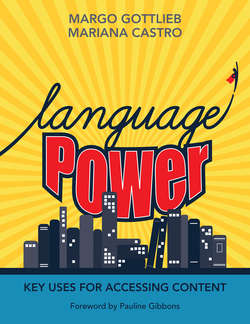Читать книгу Language Power - Margo Gottlieb - Страница 32
На сайте Литреса книга снята с продажи.
Apply A Rationale for Key Uses for Academic Language
ОглавлениеAs we have mentioned, in school, language serves as the vehicle for communicating ideas, information, and knowledge; it is also the tool for interacting with others as we learn new skills and engage in content area practices. The ultimate goal of this multiyear project initiated at WIDA, Wisconsin Center for Education Research, University of Wisconsin–Madison, was to support teachers’ focus on oral and written language use in their content classrooms and to promote collaboration among teachers around the role of language in learning.
We shared the array of language uses we unearthed from extensive reviews of literature, examination of state academic content standards, analysis of instructional materials, and interaction occurring in classrooms with experts in the field of linguistics and language education, our colleagues, and practitioners. After arranging the many reasons for communicating (that is, identifying language functions, such as describe, compare and contrast, defend, and state) into categories, four key uses of academic language emerged as the most salient purposes. Having secured evidence from multiple data sources, we felt confident that the key uses of academic language would indeed help teachers and school leaders better grasp the important role of language in their disciplinary practices.
At first, three main academic purposes for language use were identified: argue, recount, and explain. A fourth key use, discuss, was added to highlight the increased attention to oral discourse, collaborative learning settings, and targeted interaction among students in today’s classrooms. In our book, we make an acronym from these four overarching purposes for communication—discuss, argue, recount, and explain—DARE. We think that DARE serves our intent well, as we wish to challenge educators in consciously and intentionally infusing these key uses of academic language into teaching and learning. In DARE-ing educators, we hope that key uses of academic language can serve as a conceptual tool and an entry point for deeper conversations within and across the disciplines.
To make the terms more tangible, we use the following definitions for DARE:
Discuss: To interact with others or with content as a means of negotiating meaning, cocreating new knowledge, or sharing information.
Argue: To give opinions with reasons, make claims backed by evidence, or debate topics with the intent of persuading others.
Recount: To inform others; recall experiences or events; or display knowledge, information, or ideas.
Explain: To make ideas, situations, or issues clear through how or why; to account for cause or effect; or to describe complex relationships by providing details or facts.
